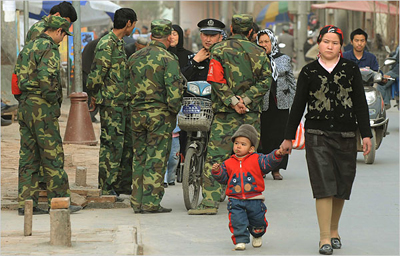|
China Admits Recent Protest in
Muslim Province
New York Times
April 2, 2008
By HOWARD W. FRENCH

SHANGHAI — Acknowledging a recent protest in the
Muslim, northwestern province of Xinjian, the Chinese
government has announced that Islamic separatist
groups are seeking to foment unrest there.
The demonstration, which appears to have been quickly
suppressed, took place in the town of Khotan on March
23, at a time when China was already grappling with
widespread protests in Tibet and in neighboring
provinces to the south and east of Xinjiang where
Tibetans live in large numbers.
The news of the protest in Xinjiang underscored the
breadth of China’s problems with ethnic and religious
minority groups in the country’s vast western regions,
where there is a long history of unhappiness with
Chinese rule.
“A small number of elements tried to incite splittism,
create disturbances in the market place and even trick
the masses into an uprising,” a statement published on
the Web site of the Khotan government said Wednesday
in the first acknowledgment of the disturbances.
Uighur residents of Khotan reached by telephone either
claimed not to understand Chinese or refused to talk
about recent events there. But Han residents said that
as many as 500 members of China’s Uighur minority
group protested in the center of the city. Some
reports have said the Uighurs, who are Muslim, were
objecting to restrictions on wearing Islamic scarves
and head coverings. Some interviewees, however, said
the protesters were seeking independence. The
demonstrators were quickly arrested by security forces
who took control of the area.
Zhu Linxiu, a senior police official in Khotan,
declined to comment in detail about the incident,
saying it was “inappropriate to publicize.” He refused
to confirm the number of protesters or arrests, but
said the demonstrators were “instigated by bad
elements.”
Two weeks before the reported protest in Khotan, China
announced the discovery of what it called a terrorist
plot in Xinjiang, which it said involved the smuggling
of combustible liquids onto a commercial airliner by a
Uighur woman who had spent time in neighboring
Pakistan.
Officials called the incident part of a terrorist
campaign by a radical Islamic independence group, the
East Turkestan Islamic Movement. Uighur groups have
denied the reports, and called them part of an effort
to justify heavily stepped-up security in the region
and the suppression of dissent before the Olympics.
In recent days, Beijing has also accused supporters of
the exiled Tibetan spiritual leader, the Dalai Lama,
of plotting a suicide bombing campaign against China,
as part of a separatist campaign.
On Tuesday, Amnesty International criticized the
government for its crackdown on protest in Tibetan
areas of China, and said the country’s efforts to
silence dissidents before the Olympics violated
Beijing’s pledges to improve human rights before it
hosts the games in August. “The Olympic Games have so
far failed to act as a catalyst for reform,” the
international human rights groups said in a statement.
“Unless urgent steps are taken to redress the
situation, a positive human rights legacy for the
Beijing Olympics looks increasingly beyond reach.”
A Chinese Foreign Ministry spokeswoman, Jiang Yu,
denounced the Amnesty statement as “biased,” saying
“anyone planning to use the Olympics to threaten
China, or planning to put pressure on China, has
miscalculated.”
Like Tibetans in Tibet, Uighurs have historically been
the predominant ethnic group in Xinjiang, which is
officially known as the Xinjiang Uighur Autonomous
Region. In both Tibet and Xinjiang, indigenous groups
have chafed at the arrival of large numbers of
migrants from China’s Han majority, who have been
spurred on in recent years by official government
encouragement of western migration by Han.
Uighurs, like Tibetans, have complained over economic
domination by the recent Han arrivals, over the
predominance of Han in senior government and Communist
Party posts in the province and over what they
perceive as heavy-handed Chinese government control
over their religious activities.
In telephone interviews, Han residents of Khotan and
nearby areas said there was a long history of distrust
and tension between Han and Uighur communities. Some
Han migrants insisted the atmosphere remained
volatile, and said that the Uighurs had been inspired
by the recent Tibetan unrest.
“Some of jobless people here have heard about the
situation Tibet, and they also want to make trouble,”
said Wang Guoliang, a Han grocery store owner in
Khotan. “They want independence and they want to expel
the Han, who they dislike. Most of the main cadres in
the Party, from counties and the cities to the
provincial level are all Hans, while the local level
officials are Uighur.” Mr. Wang called the purging of
Uighur officials several years ago after a previous
bout of tension “the root of the protest.”
Another Han, a clerk in a local bank who would only
give his name as Chen, said there had been a long
history of discontent in the region, and that people
had been “on the lookout” since mid-March. At his
bank, Mr. Chen said there had been grumblings over the
restrictions on Muslim headgear, which he disagreed
with, saying: “It is their national custom and we
should respect it.”
.
From:http://www.nytimes.com/2008/04/02/world/asia/03china.html?
ex=1207800000&en=8ce5c0d35bf28b51&ei=5070&emc=eta1
|



